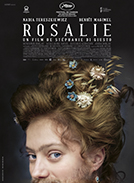Rosalie

| Original title: | Rosalie |
| Director: | Stéphanie Di Giusto |
| Release: | Cinema |
| Running time: | 115 minutes |
| Release date: | Not communicated |
| Rating: |
Mulder's Review
Rosalie, directed by Stéphanie Di Giusto, is a complex work based on 19th-century societal norms, feminism and the perpetual quest for self-acceptance, set against the backdrop of rural France. Building on the stylistic and thematic foundations laid by Di Giusto's first film, The Dancer, the film focuses on the life of Rosalie, a character who, unlike the real Loie Fuller, represents a composite of various people living with hirsutism, a disease that causes excessive growth of body hair.
At the heart of Rosalie is a nuanced exploration of the human condition, particularly through the eyes of a woman who defies the conventional beauty standards of her time. Nadia Tereszkiewicz convincingly plays the role of Rosalie, whose marriage to Abel, played by Benoît Magimel, forms the focal point of the story. The marriage, initially transactional and marred by Abel's shock at Rosalie's condition, gradually transforms into a story of acceptance and love, albeit not without its trials and tribulations.
The film navigates the dichotomy between spectacle and individual, as Rosalie's initial objectification within her small town transforms into acceptance, pushing viewers to confront their perceptions of normalcy and otherness. This shift is emblematic of the broader societal critique contained in the film, which tackles themes of intolerance, the gaze and commodification of the unusual.
Although Rosalie was criticized during its screening at the Cannes International Film Festival for veering into melodrama and for its somewhat overly formal narrative, it stands out for its authentic depiction of its protagonist's struggle for acceptance, both within and outside her community. The script, though sometimes criticized for its lack of depth, manages to weave a captivating tale that transcends the historical period it depicts and resonates with contemporary audiences through its exploration of gender, sexuality and defiance of societal norms.
The cinematography and costume design are to be commended for their rich detail and contribution to the immersive quality of the film, capturing the essence of the period while supporting the thematic underpinnings of the story. Despite its moments of predictability, Rosalie is an important work for its depiction of resilience and the capacity for love and acceptance in the face of adversity, summed up in the journey of its main character.
Rosalie is more than a period drama; it is a reflection on the complexity of human nature and the ongoing struggle for self-acceptance and love. It encourages viewers to look beyond the surface, question societal norms and embrace the beauty of what is unique. While it doesn't delve into the psychological intricacies of its characters, its visual storytelling and poignant narrative make it an important addition to the landscape of feminist cinema.
Rosalie
Directed by Stéphanie Di Giusto
Written by Stéphanie Di Giusto, Sandrine Le Coustumer, Alexandra Echkenazi
Produced by Alain Attal
Starring Nadia Tereszkiewicz, Benoît Magimel
Cinematography : Christos Voudouris
Edited by Nassim Gordji-Tehrani
Music by Hania Rani
Production companies: Trésor Films, France 3 Cinéma, Laurent Dassault Rond Point, Artémis Productions, Gaumont
Distributed by Gaumont (France)
Release dates : 18 May 2023 (Cannes), 10 April 2024 (France)
Running time : 115 minutes
Seen March 20, 2024 at Forum des Images, room 500
Mulder's Mark:

